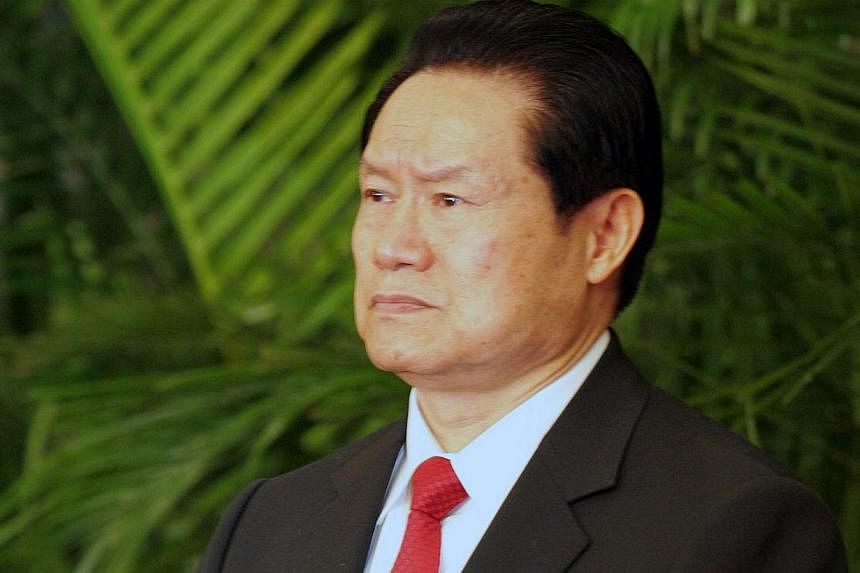Shaded by camphor trees, the nondescript ancestral burial ground of Mr Zhou Yongkang's family in Xi Qian Tou village in the eastern Chinese city of Wuxi has turned into a mini tourist attraction over the past year.
That the five simple tombstones in the small village have attracted curious visitors is a manifestation of the spectacular downfall of Mr Zhou, China's former public security czar who retired from the apex Politburo Standing Committee (PSC) in 2012.
On Saturday, state media announced his arrest and expulsion from the Chinese Communist Party (CCP), thus setting the stage for the trial of a man who was, until recently, one of China's most powerful men.
Mr Zhou, 72, faces a judicial probe for a slew of charges, including taking bribes, helping family members and cronies plunder government assets, and leaking official secrets, according to the official Xinhua news agency.
This latest development follows a corruption probe launched against him by the CCP in July, an unprecedented move that showed how President Xi Jinping's anti- corruption drive had reached levels of the nation's leadership previously thought untouchable.
Many, however, believe that the real reason for the probe is Mr Zhou's close ties with ousted Chongqing party boss Bo Xilai, who was sentenced to life in prison for bribery, embezzlement and abuse of power in September last year.
During investigations into Bo's wrongdoings, allegations had surfaced that the two men had plotted a coup against Mr Xi. There were even accusations that they had bugged the phones of top leaders, including then President Hu Jintao.
Whatever the reason for Mr Zhou's fall from grace, it marked the end of a remarkable journey that took him from his humble roots to the apex of China's power structure.
Born in 1942, in Wuxi in coastal Jiangsu province to a father who caught eels and a mother who raised silkworms, Mr Zhou graduated from the Beijing Petroleum Institute in 1966 and joined the Liaohe Oil Exploration Bureau.
Described as a capable and humble young party cadre, he was known more for his political savvy than technical knowledge, according to CNN.
He was also said to be a decisive leader who focused on both domestic oil exploration and overseas projects - a strategy that continues to this day.
Over the next three decades, he rose steadily through the ranks in China's state-controlled oil sector and, by 1996, was the general manager of the China National Petroleum Corporation, the country's largest energy firm.
He then had a brief stint helming the land and resources ministry before becoming party chief of Sichuan province in 1999.
His stellar rise to prominence was not without a helping hand.
Mr Zhou got to know Mr Zeng Qinghong, who was secretary to then Petroleum Industry Minister Yu Qiuli, during his time at the energy sector. Mr Zeng would rise to become China's vice-president in 2003.
In 2002, when Mr Zeng - a close ally of former Chinese president Jiang Zemin - entered the PSC as its fifth-ranked leader, he orchestrated moves to install Mr Zhou in the Politburo and as the new public security minister despite Mr Zhou's lack of a police career or law degree.
Mr Zhou's political career peaked in 2007 when he entered the PSC as its ninth-ranked member and headed the CCP's Politics and Law Commission, which oversees the courts, police and other legal enforcement bodies.
He was known to be a ruthless hardliner, seen in his relentless efforts to contain "hostile forces" such as pro-democracy campaigners and political activists in restive Tibet. He also maintained a vast "stability maintenance" apparatus that included extra-legal penal systems, according to The Guardian newspaper.
During his tenure - during which he oversaw security for the 2008 Beijing Olympics - China's domestic security budget exceeded that of its military, a testament to the significant power he wielded.
But expansion of the security forces reportedly unnerved many top leaders. This was not helped by the coup plot allegations. Early last year, rumours started swirling that Mr Zhou had come under scrutiny when the CCP investigated and detained his former subordinates, including former Sichuan vice-governor Guo Yongxiang, his long-time secretary.
Since then, the dragnet around Mr Zhou has widened to include the investigation of over 300 of his relatives and former subordinates in Sichuan province, and the energy and security sectors.
More than 10 of his relatives have reportedly been detained, among them Mr Zhou's one-time television reporter wife, Ms Jia Xiaoye; his elder son from a previous marriage, Mr Zhou Bin; and Mr Zhou's brother.
With his recent arrest, some say Mr Zhou's heavy-handed style has come full circle.
"We lawyers all believe that he took rule of law in China backwards by at least a decade," said Ms Li Xiaolin, a lawyer who has represented officials facing corruption charges, according to a Reuters report.
"Now he's become a victim of the lack of rule of law because his case is also being dealt with by the legal system that he himself built with his own hands," she added.


